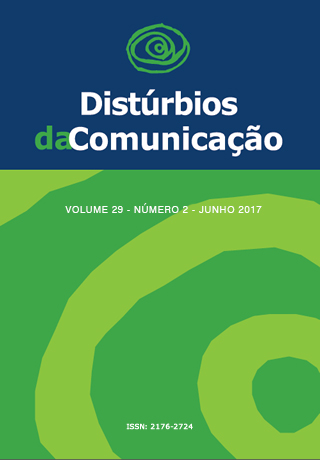Caracterización de la memoria en adultos y adultos mayores hospitalizados
DOI:
https://doi.org/10.23925/2176-2724.2017v29i2p218-226Palabras clave:
, Memoria, Comunicación, Hospitalización, Fonoaudiología.Resumen
Introducción: las alteraciones en la memoria pueden influir en la comunicación y, de esta forma, interferir con la calidad de vida del individuo. Objetivo: caracterizar la memoria semántica, la memoria operacional y de corto plazo en adultos y adultos mayores hospitalizados. Materiales y Método: participaron treinta pacientes, adultos y adultos mayores, ingresados en la ala de clínica médica de un hospital regional. Todos fueron sometidos a test de recordación de un mensaje, repetición de palabras y dígitos (orden directa e inversa), fluidez verbal semántica y fonológica, y a prueba de abstracción y memoria semántica. Resultados: 76,7% de los pacientes tenía leve dificultad para recordar el mensaje. El promedio de puntuación en la prueba de repetición fue de 5,5 para palabras, 5,0 para dígitos y 4,0 para dígitos en orden inverso. La fluidez verbal semántica y la fonológica se presentaron correlacionadas. En la tarea de abstracción y memoria semántica la mayor dificultad fue la interpretación de proverbios populares. Conclusión: un número significativo de pacientes demostró dificultad en algunas de las pruebas de memoriaDescargas
Descargas
Publicado
Número
Sección
Licencia
Derechos de autor 2017 Kelly da Silva, Adriano Freitas do Santos, Patricia Zuanetti, Rodrigo Dornelas, Raphaela Barroso Guedes-Granzotti

Esta obra está bajo una licencia internacional Creative Commons Atribución 4.0.









